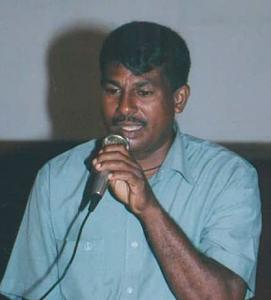 On 23 June 2015, the Negombo High Court judge M.Z. Razeen found Sub Inspector Suresh Gunaratne and one of his assistants guilty of murdering Gerald Mervin Perera in November 2004. The two policemen have been sentenced to death. Another case of torture is pending against the same Sub Inspector and several other police officers who were attached to Wattala Police Station in 2002 for torturing and seriously injuring the victim, Gerald Mervin Perera. Gerald suffered a kidney failure because of the torture he suffered in custody in 2002.
On 23 June 2015, the Negombo High Court judge M.Z. Razeen found Sub Inspector Suresh Gunaratne and one of his assistants guilty of murdering Gerald Mervin Perera in November 2004. The two policemen have been sentenced to death. Another case of torture is pending against the same Sub Inspector and several other police officers who were attached to Wattala Police Station in 2002 for torturing and seriously injuring the victim, Gerald Mervin Perera. Gerald suffered a kidney failure because of the torture he suffered in custody in 2002.
Gerald was to give evidence at the High Court of Negombo relating to the torture he suffered at the Wattala Police Station in 2002. It was for the purpose of stopping him from giving evidence in court that he was pursued. On 21 November 2004, while he was travelling to work in a bus he was shot.
Shortly before his killing, the Supreme Court of Sri Lanka found the Officer-in-Charge (OIC) of the Wattala Police Station Sena Suraweera, Sub-Inspector (SI) Suresh Gunaratne, and several other police officers to have violated the constitutional rights guaranteed under Article 11 of the Constitution by torturing Gerald. In a landmark judgement, Justice Mark Fernando, along with two other judges, awarded the highest compensation till then for Gerald Perera, ordering the police officers and the State to pay also the medical cost for treatment at a private hospital.
In a lengthy judgement, the court stated that Gerald was arrested on mistaken identity for no other reason other than him bearing the name Gerald. The court stated that the police should have released Gerald after a short inquiry into his identity, but instead the police officers brutally assaulted him without asking him a single question. The Court also observed that even after causing serious injury, the police officers failed to take Gerald urgently to a hospital for medical care, which was their duty.
It was after the judgement in the fundamental rights case in the Supreme Court that the Attorney General filed an indictment against the Sena Suraweera, OIC of Wattala Police Station, SI Suresh Gunaratne and several other policemen, for committing a crime under Convention Against Torture Act No. 22 of 1994. Later, OIC Sena Suraweera’s name was removed from the list of the accused by an application made by the State counsel on behalf of the Attorney General. The reason for removing the name of OIC Sena Suraweera has never been explained. It was when Gerald Perera was to give evidence in this case that he was assassinated.
The verdict in the murder case has arrived after 10 years of indictment. In fact, given the limited number of actual working hours spent on this case in court, the case could have been brought to an end much earlier had the trial been heard on a day-to-day basis.
It must be said that the officers of the Criminal Investigation Division did an excellent job in investigating this case and uncovering all the matters relating to the crime within a short period of time. The successful conviction demonstrates that competence and capacity for such investigations does exist in Sri Lanka. If, in many crimes, there are failures in investigation, it is not due to lack of competence, but due to many unresolved administrative problems that besets the criminal justice administration in Sri Lanka.
Despite this successful conviction, one mystery still remains unresolved in relation to the torture of Gerald Perera. The team that was led by SI Suresh Gunaratne, who arrested Gerald Perera, was working under the direction of Assistant Superintendent of Police (ASP). No attempt has been made to investigate the responsibility of this ASP with regard to the torture of Gerald Perera and for subsequent events.
Conviction of the SI and his assistant arrives 3 days prior to the International Day in Support of Victims of Torture. It is an appropriate reminder to the government as well as to the law enforcement agencies for the need to eliminate torture in Sri Lanka, currently a widespread practice.
The successful conviction of these 2 accused is itself proof that criminal investigations can be conducted without the use of torture. The two accused were never subjected to any torture or ill-treatment and they never complained of any maltreatment. Similarly, previous months have seen several other important criminal cases being investigated, and in some cases charges have already been filed. In all these high profile cases, there is no complaint of torture made by any of the accused. Strangely, all complaints come from accused that are from poorer backgrounds and from low-income groups. Thus, criminal investigations in Sri Lanka are conducted without torture when high-profile personalities are involved and torture is invariable used against persons from low-income groups even when most of these persons are innocent like Gerald Perera.
A lesson to be learnt from this case is that the use of torture is completely unnecessary for the conduct of successful criminal investigation. Those who still use torture face the possibility of suffering grim consequences just as the accused in this case.
The Asian Human Rights Commission (AHRC) does not support the death penalty. However, the AHRC is aware that Sri Lanka has an abstentionist policy, and does not execute convicts with death sentences.c